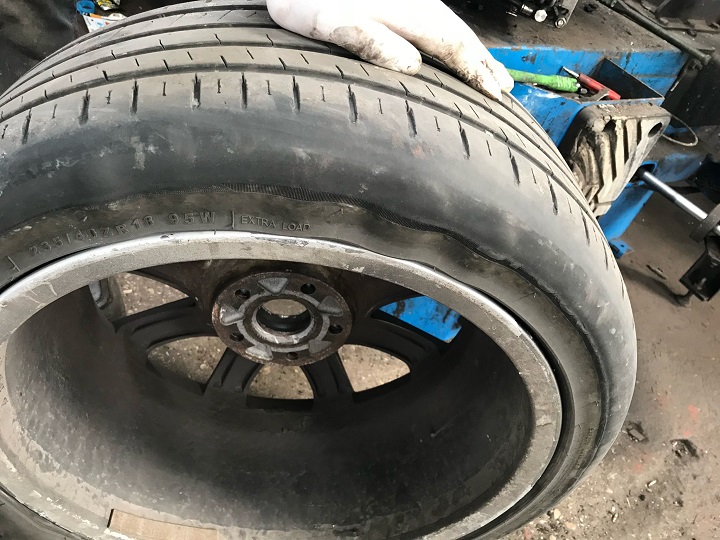
Leaders across policing, government policy, road safety and industry have united to demand urgent action on tyre safety, after new figures revealed a record 2.15 million vehicles failed their MOT due to tyre defects in the past year.
Driver and Vehicle Standards Agency (DVSA) data shows that 2,152,849 vehicles failed the MOT on tyre defects in 2023-24 – up from just over 2 million the previous year, and rising steadily from 1.83 million in 2019-20.
Alarmingly, 36% of these failures – more than 750,000 vehicles – had previously been flagged with tyre-related advisories, potentially exposing a widespread and dangerous pattern of ignored warnings.
A group of key road safety stakeholders – including the National Police Chiefs’ Council (NPCC), Parliamentary Advisory Council for Transport Safety (PACTS), Royal Society for the Prevention of Accidents (RoSPA) and TyreSafe – is demanding tighter safety regulations, warning that lives are being put at risk.
The data has been analysed by Verifleet, a UK vehicle compliance platform that helps fleets and businesses stay roadworthy. Verifleet is supporting campaigners in their call to tighten the law and close the dangerous gaps in tyre safety enforcement.
With this serious safety risk escalating, they are calling for mandatory follow-up action within three months of a tyre advisory – such as driver alerts, prompts or proof-of-replacement requirements – to ensure defective tyres are not left unaddressed.
Commander Kyle Gordon from the NPCC roads policing portfolio, said: “These figures are truly shocking. Over two million vehicles failing MOT due to something as basic as safe tyres is frightening. Tyre safety is not simply about compliance, it is absolutely critical to the safety of everyone using our roads.
“Defective tyres can turn even a careful and competent law abiding driver into a killer as the weakest link in a chain of causality leading to a collision.
“With an average of five road deaths, and 80 serious injuries every day on our roads, it is the responsibility of every driver and rider to ensure that they are not personally the cause of the sort of daily heartbreak families and communities needlessly and consistently suffer at the hands of irresponsible road users.”
Tyre safety is critical because tyres are the only part of a vehicle that makes direct contact with the road. Worn, underinflated or damaged tyres significantly increase braking distances, reduce grip and stability, and raise the risk of losing control, particularly in wet or emergency conditions.
In the UK, tyre safety is only formally checked once a year at MOT – with no mandatory inspections or reminders in between.
Drivers often receive a tyre advisory at MOT, warning that tread is low or tyres are wearing unevenly – a sign they should be replaced soon, before becoming unsafe. But with no legal obligation or follow-up system in place, the onus is entirely on the driver to do the right thing.
In reality, many drivers ignore the advisory, Verifleet says.
Richard Stowe, director of Verifleet, said: “We wouldn’t accept silence from our GP after a health warning – we’d expect a prompt, a follow-up, even a reminder by text. So why are we so relaxed when it comes to something as potentially catastrophic as defective tyres?
“We have the technology and the data to issue simple, targeted reminders after an MOT advisory, yet we leave it entirely to the driver. The consequences of that inaction can be fatal. It’s time we treated tyre safety with the seriousness it deserves.”
Jamie Hassall, executive director of PACTS, said: “It’s clear the current system is not working given the numbers of MOT fails relating to a critical safety element of the vehicle. We need a people-centred approach using the safe system to ensure safety critical defects are being picked up earlier and supporting drivers to be safer so the police can focus on those that don’t.
“Given the maximum fine per tyre is £2,500, and up to £5,000 for commercial vehicles, the Government could be collecting over £5 billion in fines, should more resources be needed to look at this differently and fund wider road safety projects.”
Stuart Lovatt, chair of TyreSafe, said: “The escalating number of MOT failures due to tyre defects, particularly the significant proportion linked to ignored minor defects and advisories from a previous MOT, presents a deeply worrying picture for road safety in the UK.
“These figures strongly suggest a widespread lack of attention to a component that is literally the only contact between a vehicle and the road. This latest data serves as a stark reminder of the urgent need for not only all drivers to prioritise regular tyre checks and act immediately on any warnings received, but also for consistent compliance with the legal standards regarding tyre condition.”
I’d like to see more pop up free tyre checks on retail parks. And I mean genuinely free and not run or overtly sponsored by tyre sellers. This would raise awareness, improve knowledge of drivers, but also find defects.
Perhaps the Road Safety Trust could fund this alongside Dft?
Peter Whitfield, Liverpool
+1
In road safety news articles about tyres, is it really necessary for us to be repeatedly told that “.. tyres are the only contact between the vehicle and the road..” Do some people think the vehicle will float away if it didn’t have tyres in contact with the road?
Hugh Jones, Cheshire
+3